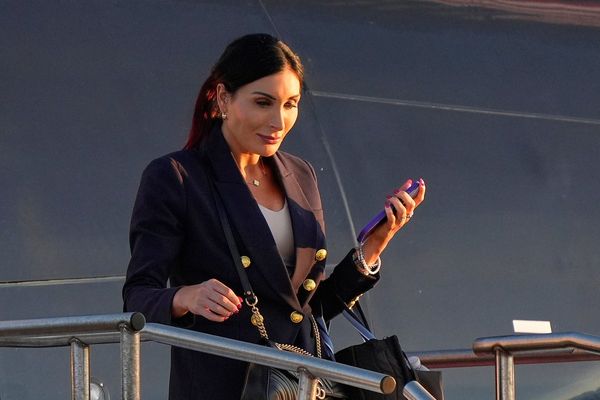
The banner in Legia Warsaw’s near-empty away section said more than any action on a football pitch could. Down below, Dinamo Minsk were falling to a 4-0 defeat against the home side in last week’s Conference League fixture but no one really cared. “Voices silenced but must not be forgotten,” it read, the slogan continuing beneath an image of Belarus repurposed to depict hands grasping at prison cell bars. “Free all the political prisoners.”
Afterwards, token attempts by exiled Belarusian media to engage Dinamo’s players in non-football conversation were stonewalled. The stakes were too high, the potential for retribution too great; everyone knew that really. Back across the border the away side went: another empty sham of a sporting institution representing little beyond the government of a pariah state.
Four of the Dinamo squad have been on the road again this week, preparing for national team duty. On Friday evening they will face Northern Ireland at Windsor Park in a Nations League fixture that, for a while, was shrouded in doubt. Belarus have been banned from playing in their home country since March 2022, a punishment applied by Fifa and Uefa for the country’s role facilitating the illegal Russian invasion of Ukraine. Entry to other states is at the hosts’ discretion and the UK government, which has imposed sanctions on Belarus for the same reason, took time to decide whether the footballers should be granted visas.
Permission was granted a fortnight ago to the relief of the Irish FA, which sensed theirs would be the team suffering unduly if the fixture were moved abroad. So Belarus will play in Belfast, hoping to at least emulate last month’s “home” stalemate between the two in the Hungarian city Zalaegerszeg and, consciously or not, looking to deflect from the impression that their presence is a stain on the sport.
Waving through Belarus’s presence on the international stage entails tacit endorsement of manifold horrors. Its complicity with Russia’s abuses is appalling enough before the domestic picture, and an atrocious human rights record in which football and footballers have not been spared, is accounted for. There are believed to be more than 1,300 political prisoners, the same individuals referenced by those fans in Warsaw, in Belarus. These incarcerations have often been the result of the slightest opposition to Alexander Lukashenko’s authoritarian regime.
More than one player has spent time in jail. About 48 footballers are believed to have been blacklisted by the Belarusian ministry of sport for expressing anti-government views, participating in demonstrations or refusing to engage in shows of support. That has led in some cases to contracts being refused or terminated, and in practice means the Belarus team is packed only with players with which the state considers itself to be compatible. While the local football federation has succeeded in rehabilitating some of the blacklisted players’ domestic careers over the past year, attempts to extend the same to those with national team potential are thought to have run aground at government level. None of international football’s governing bodies appear overly concerned by the suggestion of state interference in one of their member associations.
The fear in Belarus is that, with the likely formality of Lukashenko’s re-election due in late January, the atmosphere of repression will worsen still. But football continues and, on Monday, the national team coach, Carlos Alos, was handed a two-year contract extension that is reported to include a pay rise. Alos, a 49-year-old Spaniard, has been in charge for just over a year. Rwanda and Qatar are among the places he has previously worked.
On a sporting level Alos has achieved a level of success, leading a desolate team to impressive early draws against Switzerland and Romania along with a victory in Kosovo. They are unbeaten in four games and a point behind Northern Ireland, who lead group three of Nations League C. “We still have a chance for first place,” Alos said. “We cannot train without thinking about victory. We are setting maximum goals for the match.”
Among Alos’s tasks is to qualify Belarus for the 2026 World Cup. That is a highly unlikely outcome but a more relevant question is how football’s ruling powers will perceive them by then. Their presence on the continental scene, whether at national team or club level, is hardly popular: one practical example comes in the form of Dinamo’s arrangement to host this season’s “home” Conference League games in friendly Azerbaijan, which is frustrating for opposing clubs forced into lengthy trips to closed-door ties with no financial reward. But they and Russia have plenty of advocates within Uefa and Fifa; there are some in the game who worry that, if relations with the two countries become normalised under Donald Trump’s US presidency, pressure will grow to swiftly ease sporting sanctions.
Dinamo had opted not to organise tickets for their fans to attend the Legia game, despite the countries’ proximity and the club’s profile within Belarus. Perhaps they understood what was coming. The banner highlighting the prisoners’ plight was far from the only show of anger with Lukashenko’s regime to make its way into the stadium. Sections of the Legia support visibly and audibly lent their weight too. It remains to be seen whether Windsor Park is furnished with similar displays; regardless, Northern Ireland’s visitors are merely a puppet for a country that has no sporting credit left.







